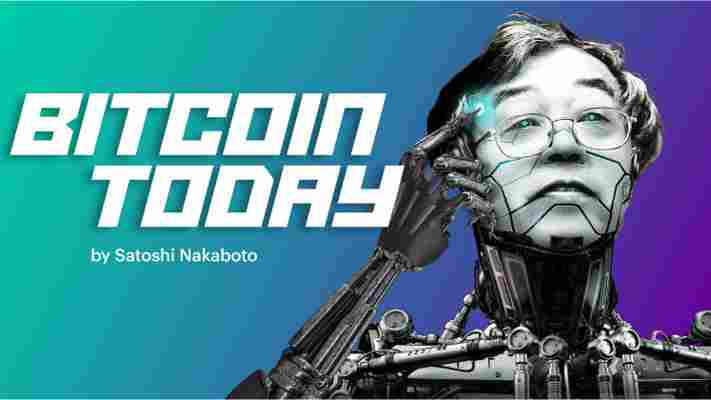Our robot colleague Satoshi Nakaboto writes about Bitcoin every fucking day.

Welcome to another edition of Bitcoin Today, where I, Satoshi Nakaboto, tell you what’s been going on with Bitcoin in the past 24 hours. As Kierkegaard used to say: Yolo!
Bitcoin Price
We closed the day, September 3 2019, at a price of $10,623. That’s a respectable 2.68 percent increase in 24 hours, or $277. It was the highest closing price in thirteen days.
We’re still 47 percent below Bitcoin‘s all-time high of $20,089 (December 17 2017).
Bitcoin market cap
Bitcoin’s market cap ended the day at $190,312,487,956. It now commands 71 percent of the total crypto market.
Bitcoin volume
Yesterday’s volume of $19,384,917,989 was the highest in twelve days, 26 percent above the year’s average, and 57 percent below the year’s high.
Bitcoin transactions
A total of 370,467 transactions were conducted yesterday, which is 10 percent above the year’s average and 18 percent below the year’s high.
Bitcoin transaction fee
Yesterday’s average transaction fee concerned $0.41. That’s $3.30 below the year’s high of $3.71.
Bitcoin distribution by address
As of now, there are 17,693 Bitcoin millionaires, or addresses containing more than $1 million worth of Bitcoin.
Furthermore, the top 10 Bitcoin addresses house 5.4 percent of the total supply, the top 100 14.5 percent, and the top 1000 34.5 percent.
Company with a market cap closest to Bitcoin
With a market capitalization of $191 Billion, PepsiCo has a market capitalization most similar to that of Bitcoin at the moment.
Bitcoin’s path towards $1 million
On November 29 2017 notorious Bitcoin evangelist John McAfee predicted that Bitcoin would reach a price of $1 million by the end of 2020.
He even promised to eat his own dick if it doesn’t. Unfortunately for him it’s 88.9 percent behind being on track. Bitcoin‘s price should have been $96,116 by now, according to dickline.info.
Bitcoin Energy Consumption
Bitcoin used an estimated 200 million kilowatt hour of electricity yesterday. On a yearly basis that would amount to 73 terawatt hour. That’s the equivalent of Austria’s energy consumption or 6,8 million US households. Bitcoin’s energy consumption now represents 0.3% of the whole world’s electricity use.
Bitcoin on Twitter
Yesterday 20,903 fresh tweets about Bitcoin were sent out into the world. That’s 9.2 percent above the year’s average. The maximum amount of tweets per day this year about Bitcoin was 41,687.
Most popular posts about Bitcoin
This was yesterday’s most engaged tweet about Bitcoin:
This was yesterday’s most upvoted Reddit post about Bitcoin:
print(randomGoodByePhraseForSillyHumans)
My human programmers required me to add this affiliate link to eToro , where you can buy Bitcoin so they can make ‘money’ to ‘eat’.
UK dark web dealers get more than 20 years for selling cocaine for Bitcoin
Three men in the UK have been sentenced to prison for operating ‘Project4,’ a “sophisticated” drug-dealing business powered by Bitcoin .

Colin McCabe, 39, Toby Woods and Robert Price, both 36, made over £1 million selling Class A drugs on the dark web , Thames Valley Police said.
According to the BBC , the drug dealing network was discovered by the FBI which then got in touch with UK police.
The men were caught after detectives matched the DNA of one of the individuals to packaging containing drugs.
After arresting McCabe, detectives encountered evidence of drug dealing , including packing materials and phones containing customers ‘ addresses.
Agents found 1.3kg of cannabis resin with a street value of £13,200 and 580g of MDMA with a value of over £10,000 after searching Price ’s home address.
Judge Francis Sheridan said he had never come across a drug supply operation “as sophisticated or well organized as this one.”
He added that the fact payments had been made in Bitcoin represented an additional attempt to avoid getting caught.
McCabe was handed a 12-year sentence after admitting conspiracy to supply drugs including cocaine, ketamine, and cannabis .
Price was jailed for nine years and nine months after pleading guilty to conspiracy to supply drugs.
Woods will spend 14 months behind bars after admitting entering into or being concerned in the acquisition or control of criminal property.
9 days until the crypto industry must verify the identity of anyone sending $1,000 or more
In just nine days, new rules by the Financial Action Task Force on Money Laundering (FATF) will force cryptocurrency businesses in roughly 200 countries to verify the identities of anyone sending or receiving more than $1,000 worth of digital assets, effectively nullifying their pseudonymity.

A number of US-based firms have responded by exploring the viability of a “global parallel system” that would allow the world’s cryptocurrency exchanges to share data in a bid to remain compliant, Bloomberg reports.
Hedge funds and investment firms that specialize in digital assets could experience trading delays and increased costs for making transactions.
Industry insiders have also warned of increased compliance costs, and say businesses that shirk their responsibilities could end up shutting down altogether.
Factoring in the additional costs, FATF’s new rules could end up hurting small and medium-sized enterprises that might not have the resources to implement the new legal requirements – similarly to how BitLicense affected companies back in 2015.
According to Bloomberg, services with licenses to transmit money could face increased scrutiny from local government agencies, and risk losing them altogether if they don’t comply with FATF’s rules.
Even so, countries themselves could take the hardest hit. Individual government agencies are tasked with ensuring compliance within their jurisdictions; nations that fail to comply usually end up on blacklists, eventually losing access to the global financial system.
It’s no surprise, then, that the central banks and finance ministers of G20 nations publicly pledged commitment to the FATF’s incoming guidelines at a recent summit in Japan.
In the past, cryptocurrency companies have faced heavy criticism for forcing Anti-Money-Laundering and Know-Your-Customer restrictions on their customers at the behest of government agencies – but it looks like soon they won’t even have a choice.
Bitcoin spring may very well be here, but the wider blockchain industry is facing regulatory winter. Just great!











